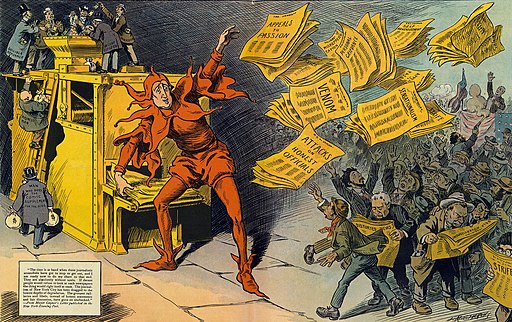- Truth, Love & Light
- Posts
- Rage Farming Drives the Algorithms
Rage Farming Drives the Algorithms
The strategy drums up emotions, followers, and cash. But we pay a considerable price for sacrificing civility, especially within politics. Welcome to the attention economy.

Attention is the new currency. Every second I spend online, I decide where to spend my attention. Should I devote any mindshare to this comment or that headline? I answer this question whenever an attractive link catches my eye or headlines are written as clickbait. Becoming aware that life online requires this kind of decision-making was my first step in learning to tune a fundamental filter on what I allow into my head—a filter under my control only if I practice controlling it. Thus, we must learn new skills to be attention-literate in a world full of nonstop information.
A Tulane University study explains why politically charged content gets more engagement from those who disagree. Researchers found a “confrontation effect,” where people are more likely to interact with content that challenges their views than those that align with them.
The study analyzed data from Twitter, Facebook, and online experiments over time, including during the 2020 U.S. presidential election, and found that users frequently react to opposing viewpoints with heightened engagement, often driven by outrage.
This research helps explain the large amount of toxic discourse we observe online. The results reveal that individuals are strongly driven to voice their outrage toward those with whom they disagree,” said study lead author Daniel Mochon, the Edward H. Austin Jr. Professor of Business Administration and an associate professor of marketing at Tulane University’s A. B. Freeman School of Business. “While previous studies show that people avoid content inconsistent with their beliefs, counter-ideological content drives higher engagement.”
Mochon noted that some social media platforms and users exploit anger to drive engagement. “Platforms benefit from keeping users active, regardless of whether the interaction is positive or negative,” he said.
What is Rage Farming?
Rage farming is a cynical political tactic used to bait opponents into overreacting to a controversial statement. This, in turn, paints the other side as unreasonable while simultaneously riling up one’s base in defense of the original position. The conflict between the two sides spirals into a pit of rage, with neither side aiming to persuade as much as humiliate, discredit, and defeat the other.
Its purpose is to increase traffic and engagement—which ultimately translates into profit for the producer—raise funds for political agendas and place targets in defense mode to disrupt their activities. It is usually employed by media influencers and politicians who seek attention and are associated with populist political movements. It is easy to see this happening in our politics with Donald Trump and his ability to create constant outrage.

A pamphlet written for the UN Economists Network explains that algorithms on social media platforms are programmed to increase engagement by increasing the virality of the content, which often promotes highly “incendiary, controversial, or polarizing” content to drive interactions (rage farming). This increases exposure to unhealthy content, frequently based on mis- or false information, significantly impairing conscious decision-making and risks creating addiction, desensitization, and radicalization. This certainly does explain a lot of the hatred that exists in the political sphere and a lot of what I experienced from Trump supporters while contacting them during the 2024 election.
This isn’t necessarily a new phenomenon; in the past, yellow journalism used lurid features and sensationalized news in newspaper publishing to attract readers and increase circulation. The phrase was coined in the 1890s to describe the tactics employed in the furious competition between two New York City newspapers, the World and the Journal. If you want more info on the history of yellow journalism, see the link below.
Rage farming is often disinformation
Over 80% of swing voters who chose Trump believed Harris held positions she didn’t campaign on in 2024, including supporting taxpayer funding for transgender surgeries for undocumented immigrants (83%), mandatory electric vehicles by 2035 (82%), decriminalizing border crossings (77%), and defunding the police (72%). These are all hot-button issues that tend to get folk’s emotions up.
How to stop rage farming from ruining your peace
The first step is identifying how, when, and where it is happening. When we see or suspect it, however, we should call it out for what it is: a deliberate attempt to manipulate voters and audiences into becoming angry. Related to this, we must realize that rage-baiting is not normal or productive and that there are alternatives.
Second, members of the press and the “Rage Farmer’s” (Republicans cough cough) party should hold politicians accountable for engaging in rage farming. I am not holding my breath on this one, as it seems to be the formula for all Republicans right now (the 2024 election was one giant rage-farming cultivation operation from the Trump campaign). And now Republicans are emboldened and continue this hatred on Capitol Hill with their bathroom wars.
Third, as consumers, we must turn away from politicians, influencers, and platforms that sow the seeds of rage and reward others with their votes and business. However, there is hope, as many rely on social media and certain political parties as the best options. A mass exodus is underway, post-2024 election, where folks using X for their news have fled mainly to the algorithm-free and friendlier BlueSky. I have left the toxic space of X for BlueSky. Follow me: https://bsky.app/profile/ylwsunflwergrl.bsky.social.
Politicians and their staff need to appreciate the more profound risks involved with rage farming. Harassment of women, people of color, and other traditionally marginalized groups is often the product of rage-farming. And it can sometimes lead to targeted violence or even attempts at insurrection, as we saw in 2021 here at our Nation’s capitol. Only rage farmers and their most avid consumers would agree that those are acceptable byproducts of democratic discourse.
How to guard your attention and your peace
Block all notifications except those essential to you (phone calls, text messages) - and even with those, feel free to use the focus settings to help guard against too many interruptions. You do not need to be notified of every breaking news story. Trust me on this.
The internet doesn’t get to decide what’s worth your attention preemptively. Feel free to pay attention if it’s more important than the work at hand. If it’s less critical, ignore it. It is always a good idea to walk away from something that causes you an emotional reaction, recenter yourself, and then come back. It is also wise in those cases to resist the urge to reply. Block and ignore rage farmers, as it takes away their power over you.
Touch grass, walk the dogs, feed the pigs—that’s what I call it for me, but we will call it grounding. Grounding is when you, as its name suggests, ground yourself into the moment by focusing on your senses and environment. If I walk outside, feel the breeze and the sky, or head down to hang out with Willie and Ziggy, the rescue pigs in the barnyard, it helps me to recenter myself and get rid of those toxic emotions. Here is a photo, don’t you feel better?

Willie and Ziggy as a baby pig (rescue pigs)
Grab a journal and start writing the thoughts that come to mind. Scribble down whatever pops into your head, and don’t make any judgments about the thoughts. Writing them down lets you slow them down and deal with the reactive emotions of the rage farming. Thus, this little newsletter helps me clear my head and think rationally.
Focus your fight on what matters. The linked article below is helpful as it outlines the tactics that will be used in an authoritarian slide—where we find ourselves with the incoming Trump Administration after the election of 2024. The 15 points outline how authoritarians manipulate institutions and the public to consolidate power and suppress dissent, including distorting the truth, inciting fear, controlling media, and undermining democratic norms. The guide emphasizes critical thinking, resisting manipulation, and fighting for democratic values as crucial to surviving an authoritarian regime. You can read it here: https://mediate.com/a-15-point-guide-to-surviving-authoritarianism/
Things I am reading/listening to this week:
I found lots of talented people with newsletters out there on BlueSky.
I would love to hear what you think. Leave any comments below.






Reply